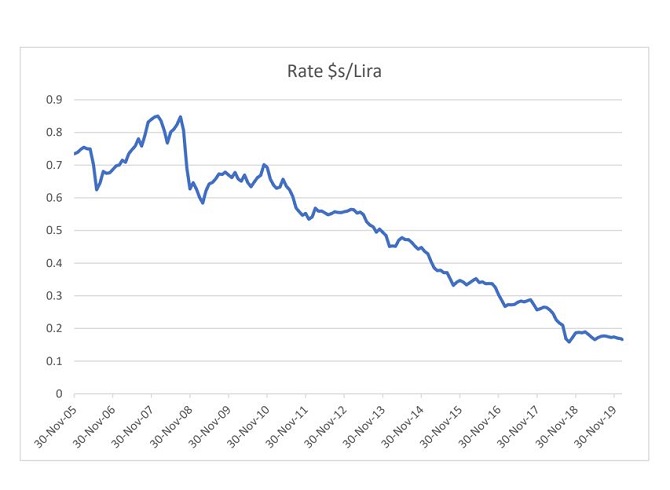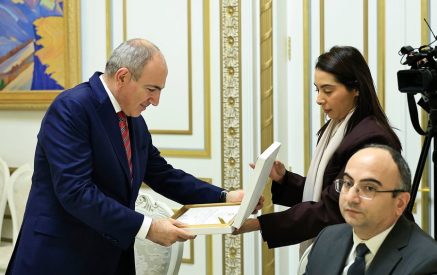The Armenian Weekly. You might think this piece has an exaggerated title. But, take a look at the accompanying graph. What would you call an 11-year-long decline in the value of something? And yes, even money has a “price” and in this case (weird though this might seem as a concept), the Turkish Lira’s just keeps on dropping.
As with all economic phenomena, the value of currencies can become a real complicated mess, tough to understand and impacted by all sorts of factors and actors, not just economic ones. Currency woes can be addressed by some actions taken by a country’s central bank, but these are of limited value and can be undertaken for a short time only.
But why should we, as Armenians, care what happens to Turkey’s money? A country’s currency is a major connection to the rest of the world and to its internal policies.
When the Turkish Lira’s value falls, life becomes more difficult for its residents since anything imported becomes more expensive (think energy/fuel in particular since that impacts everything else’s prices). At the same time, paying for money borrowed from international sources becomes more expensive for the government (and Turkey has a lot of foreign debt). At the same time, it becomes easier to export goods since they have become cheaper for outsiders, which can help the country’s economy. But, exports can be impacted by the country’s political relations. And it just keeps going on. At the same time, private sector actors, investors/speculators, could be trying to make money off a country’s currency’s misfortune, and as a result, drive its value down even further.
Read also
One source lists three factors as possible causes of currency crises: a country borrows; currency values increased rapidly; uncertainty over the government’s actions unsettles investors.
The last one on the list is particularly interesting and reflective of Turkey’s current situation. It has picked a needless fight with Syria and is now burning money on war outside its own borders and inside, supporting the huge refugee exodus from Syria. At the same time, economic and fiscal policy seems to be dictated by political considerations, leading one observer, in the summer of 2018, to describe the situation as “Asking your citizens to search under their pillows for foreign banknotes and gold to convert into domestic currency…”
Turkey is messing around in chaotic Libya; creating tensions with Cyprus, Egypt and Israel over access to undersea resources (oil and gas) in the eastern Mediterranean; building military bases in other countries; oppressing, persecuting and repressing its Kurdish population; waging anti Armenian, Assyrian, Greek and Kurdish propaganda all over the world; undertaking huge and somewhat pointless projects such as the new presidential place, over-sized airport and a canal that would create a new passage between the Black and Aegean Seas; and distancing itself from decades-long allies in NATO by flirting with Russia. All of this requires resources, money, time, credibility, leadership and attention, which are in short supply.
While some of these actions may well be in Turkey’s best interest, they all assuredly stem from President Erdoğan’s political calculations and machinations along with his massive ego. His hold on power is getting more tenuous so he is creating distractions for his people while rallying them to his artificially created “causes.” He is therefore susceptible to financial pressures, such as when U.S. President Trump slapped tariffs on Turkish steel and aluminum and threatened to mess with the Lira. In response to such actions, if Erdoğan follows the best policy path, he risks looking “weak,” something his supporters would not stomach. If he acts in his usual arrogant way, he further damages the country’s economy and currency (as he may be doing now judging by the insufficient response to the Lira’s condition by Turkey’s central bank), setting the stage for much more drastic woes in the future, leading to loss of political support.
If you take another look at the accompanying chart, and notice the dates, you’ll realize that the Lira’s fall has paralleled Erdoğan’s increasing consolidation of power over time.
Where does all this leave us? Perhaps it’s time for some of the wealthiest members of our communities, along with those who are engaged in the world’s various financial markets, to turn their attention to the Turkish Lira. They can help weaken the currency, thus weakening Turkey and driving Erdoğan to make more mistakes while making money at the same time. If you fit this description or know someone who does that you can recruit to such an effort, get to work.




























































